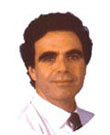As a sign of our times, the Wall Street Journal blog
noted that Eli Lilly had a white sign at their Oncology meeting in Chicago with the following message:
Food, beverages and/or meals will not be provided by Eli Lilly and Company for the following parties:
* Physicians and individuals with prescribing authority in Minnesota in order to comply with Minnesota statutes
* Government employees in New York (both city and state) in order to comply with New York statutes
Particularly tempting was the frozen yogurt that everyone could have except Minnesota doctors and NY government employees.
Lilly’s sign prohibiting free frozen yogurt to MN doctors is a clever way to make a point, tongue in cheek. Free pizza, and other trinkets have no effect whatsoever on physician prescribing patterns since doctors receive the “gifts” from all the companies. Therefore, no one company has an advantage. If you ban all trinkets by all companies in all states then the pharmaceutical companies will simply divert those marketing funds to things like DTC, eDetailing, and online sponsorship of CME courses. A much better way to deal with pharma gifts to doctors is to require all medical companies to post all gifts on their public web sites. The transparency will keep everyone honest.
WhatDoctorsThink.com performed a December 2007 online physician survey of 290 doctors in various specialties to determine their views on medical company marketing to doctors. Click to view survey.
While 40.5% of doctors agreed that medical companies shouldn’t give any gifts, 71.6% said that doctors are not influenced by these small gift items. It seems like detailed public posting of all gifts with specification of doctor recipients would keep everyone honest. I checked Lilly’s web site--don’t see the frozen yogurt listed there yet.
Our publicly posted surveys are performed on randomly selected physicians, the doctors fill them out voluntarily and are not identifiable, and are completely anonymous. Therefore, the doctors have no incentive or advantage to give false or misleading answers in the survey. Doctors then read our publicly posted surveys to see what their colleagues are thinking on major issues in healthcare. It’s one of the few effective ways that doctors can take the pulse of their colleagues on controversial issues that affect their livelihoods and affect patient care.
Monday, June 2, 2008
Subscribe to:
Post Comments (Atom)

1 comment:
Remarkable! Its genuinely remarkable post, I have got much clear idea on the topic of from this article.
Post a Comment